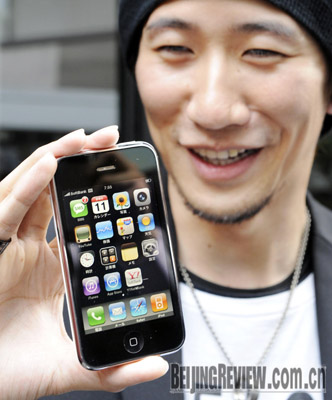|
|

|
|
NEW ARRIVAL: Apple's 3G iPhone became an instant hit with the Japanese as soon as it went on sale in the country on July 11 |
The iPhone, a faster and more versatile version of Apple Inc.'s original touch-based mobile handset, has been a market hit since it went on sale simultaneously in 22 major countries and regions on July 11.
The multifunctional handsets have had an iconic appeal for users around the world. Masses of eager iPhone fans packed every Apple store in the United States to get their hands on the new device that operates on faster 3G networks. The buying rush at one time even caused AT&T Corp., the exclusive network operator and supplier for iPhone in the United States, to run short on supplies. In Tokyo, some consumers lined up overnight for a chance to own the first 3G iPhones sold in Asia, where older versions of the handset had not been sold.
Apple sold 1 million iPhones in the first three days after they went on sale. It projected that its total handset sales would reach 5 million this year, although the computer maker is striving for sales of 10 million.
China has not been immune from iPhone mania, although the smartphones are not officially on sale here yet. The domestic media have given iPhones heavy coverage, generating much interest among the Chinese. Much speculation is swirling about the iPhone's sale in China, although Apple has not been able to sell the phone on the Chinese mainland. But this has not been for lack of interest. Salespeople at Kemao Shopping Mall at Zhongguancun, a technology hub in Beijing's Haidian District, told the Economic Information Daily that more customers have recently been asking about 3G iPhone sales.
Analysts say the updated smartphone has good reason to be the latest technology rage, because it contains several improvements compared to its predecessors. The new iPhone is much faster in retrieving data over networks on the back of speedy 3G technology. It now also has GPS satellite-positioning technologies and better camera resolutions and video capabilities. Besides this, it caters to corporate customers with capabilities such as e-mail and calendar information. And like the original iPhone, it redefines what a phone can do by combining three products in one-a mobile phone, wide-screen iPod and an Internet access device.
Du Juan, a senior analyst at Beijing-based Bayesconsulting Co. Ltd. told the Economic Information Daily that steeply discounted retail prices for the new iPhone have been fueling sales. When old 8-gigabyte and 16-gigabyte iPhone handsets were sold for $399 and $599, respectively, in the United States, many prospective buyers decided not to purchase them, because they were too expensive. But now Apple has reduced the prices of the new iPhone, selling the 8-gigabyte and 16-gigabyte 3G handsets for $199 and $399, respectively, in the United States with the stipulation that buyers must also purchase a two-year contract for AT&T's data services, Du said.
Apple has financed the price cuts by giving up a portion of the data service revenues it receives from the network operators, according to a report in the Financial Times. Apple has such arrangements with AT&T, O2 Plc of the UK, France Telecom SA and Deutsche Telekom AG.
Apple's previous agreements with its exclusive network operators gave the computer maker a certain portion of the monthly revenue paid by iPhone customers. But Apple ditched this revenue-sharing scheme in an effort to compete with less expensive rival products, such as Blackberry handsets made by Research in Motion Ltd. of Canada.
| 